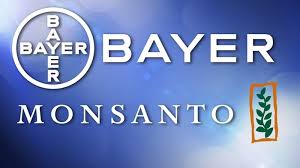
The mega acquisition of U.S. company Monsanto by German conglomerate Bayer has been approved by the antitrust body of the European Union. The deal is worth $62.5 billion.
Arguably, over one forth of the total seed and pesticides market of the world would cone under control of the new entity following the merger.
There has been a wave of consolidation in the sector with the merger of ChemChina and Syngenta and Dow and Dupont, as the industry has bene under pressure because of a wavering global farm economy competition in export of grains and fast changing weather patterns.
In the case of the other two mega mergers, substantial sale of assets to rivals had to be made by the companies to get approval from the EU antitrust body.
The combined power emerging in the digital framing data segment which can predict when farmers need to till and sow seeds and when to spray fertilizers from the mergers have been a cause of concern for environmental and farming groups, who have voiced their opposition of the deals. They are worried that the new merged companies would possess immense power.
A number pf its assets were agreed to be sold to rival BASF by Bayer which clinched the deal for approval from the European Commission.
“Our decision ensures that there will be effective competition and innovation in seeds, pesticides and digital agriculture markets also after this merger,” European Competition Commissioner Margrethe Vestager said in a statement.
“In particular, we have made sure that the number of global players actively competing in these markets stays the same.”
The commission came out with a 1,285-page ruling after examining 2.7 million internal documents and investigating over 2,000 different product markets and had thoroughly studied the consequences of the deal which had seen over a million petition being filed in relation to it with the Commission, Vestager said.
Granting of a license to its global digital farming data and sale of assets totaling 5.9 billion euros ($7.2 billion) to BASF related to its seed and herbicide business have already been reached by Bayer. The vegetable seeds business of Bayer would also be divested to BASF.
However, online campaigns group Avaaz was critical of the approval from the EU.
“This is a marriage made in hell. The Commission ignored a million people who called on them to block this deal, and caved in to lobbying to create a mega-corporation which will dominate our food supply,” Avaaz legal director Nick Flynn said.
There was need for helping the smaller players in the agriculture industry, said the Greens grouping while echoing the same sentiments in the European Parliament.
“The agriculture industry is already far too concentrated, giving a handful of massive firms a stranglehold on food production. Merging two of the biggest players only makes a bad situation worse,” Greens spokesman Bart Staes said.
(Source:www.reueters.com)
Arguably, over one forth of the total seed and pesticides market of the world would cone under control of the new entity following the merger.
There has been a wave of consolidation in the sector with the merger of ChemChina and Syngenta and Dow and Dupont, as the industry has bene under pressure because of a wavering global farm economy competition in export of grains and fast changing weather patterns.
In the case of the other two mega mergers, substantial sale of assets to rivals had to be made by the companies to get approval from the EU antitrust body.
The combined power emerging in the digital framing data segment which can predict when farmers need to till and sow seeds and when to spray fertilizers from the mergers have been a cause of concern for environmental and farming groups, who have voiced their opposition of the deals. They are worried that the new merged companies would possess immense power.
A number pf its assets were agreed to be sold to rival BASF by Bayer which clinched the deal for approval from the European Commission.
“Our decision ensures that there will be effective competition and innovation in seeds, pesticides and digital agriculture markets also after this merger,” European Competition Commissioner Margrethe Vestager said in a statement.
“In particular, we have made sure that the number of global players actively competing in these markets stays the same.”
The commission came out with a 1,285-page ruling after examining 2.7 million internal documents and investigating over 2,000 different product markets and had thoroughly studied the consequences of the deal which had seen over a million petition being filed in relation to it with the Commission, Vestager said.
Granting of a license to its global digital farming data and sale of assets totaling 5.9 billion euros ($7.2 billion) to BASF related to its seed and herbicide business have already been reached by Bayer. The vegetable seeds business of Bayer would also be divested to BASF.
However, online campaigns group Avaaz was critical of the approval from the EU.
“This is a marriage made in hell. The Commission ignored a million people who called on them to block this deal, and caved in to lobbying to create a mega-corporation which will dominate our food supply,” Avaaz legal director Nick Flynn said.
There was need for helping the smaller players in the agriculture industry, said the Greens grouping while echoing the same sentiments in the European Parliament.
“The agriculture industry is already far too concentrated, giving a handful of massive firms a stranglehold on food production. Merging two of the biggest players only makes a bad situation worse,” Greens spokesman Bart Staes said.
(Source:www.reueters.com)














